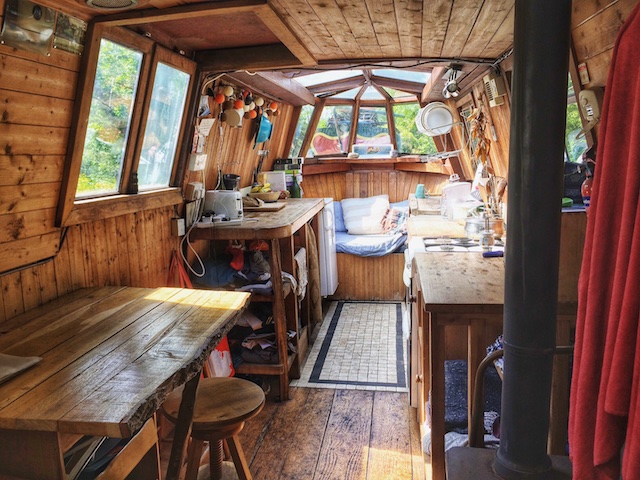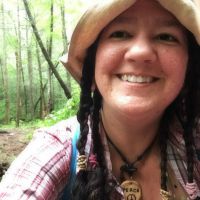We catch rainwater.
We don’t have an electric can-opener, or a microwave, or television channels, or a home phone.
We heat our house (one room really) with a wood stove during the winter. During the summer, we open the doors and windows and plug in an oscillating fan. Our little garden grows much of our food, and our chickens provide little protein bombs of nourishment every day.
We reuse everything we can, we shop locally and buy second-hand. We barter and trade with our friend-tribe for raw milk, pastured meat, mechanic work, used refrigerators, and the like.
One of my girlfriends, an adorable, petite, badass hog farmer, summed us kind of folks up nicely: “We are the kind of people who spend our change.”
You might think we are old (we’re not), or we’re living way off in the boonies (we are, sort of, but only an hour south of a major city), or that we’re undereducated and have no other options (we have degrees, certifications, and healthy resumes with solid references).
We live this way by choice.
We go to bed with backs that ache from honest work and a bank account that never quite reflects the hours we’ve put in. But we appreciate the little things, work toward better things, and we know it’s all temporary—the good stuff, the bad stuff, the hard times, the easy times.
And I think that it is essential to realize the impermanence of it all. Our lives will eventually end, but if our work, our words, and our love for our world can live on, then we’ve truly accomplished something worth the sweat and tears we’ve invested.
Sometimes we ask ourselves, “Are we doing the best we can? For each other, our loved ones, and the Earth we share?” And although we’d like to think that we are, the raw and honest truth is that we could do better. We can always do better.
Because despite the joy my Honey and I find in our simple lifestyle, I find myself in a perpetual state of homesickness. For the home of my childhood, sure. But also for an Earth, unaltered, that we will never get to experience. It’s a mourning of sorts.
We weren’t born into a time where the Earth was healthy and whole. We can’t drink the water in our nearby waterways. The fish carry chemical loads in their bloodstream. The native plants that our bodies were designed for have nearly disappeared. Invasive species (and roadways and businesses and housing developments) have taken the place of natural foods and medicines that evolved to specifically benefit the human condition.
We have lost myriads of heirloom species to factory farming, and there are varieties of vegetables and fruits that our taste buds will never know. Our ancient forests are gone, and with them, irreplaceable wild things, medicinal plants, and much human wisdom.
Eco-grief. A dull, throbbing ache that never quite goes away. An awareness of the distinct difference between a world that is, and a world that should be.
This mourning for an ecological system we were meant to be a part of is very real. Many of us feel it down in our bones. And this is why we try hard to live small and gently.
It’s the least we can do to in return for our wild and precious lives. It’s our way to show appreciation to the Earth that sustains us and to help preserve resources for humans that will live here long after we are gone.
Our contribution is not enough, but we continue to discover new (old?) ways to live a little lighter on our planet. And if we can inspire others to rethink their habits, to reduce their take and increase their giving, perhaps our pretty world will heal more quickly from some of the damage our species has caused.
Because that’s one thing about Nature: Regardless of what we do—we can chop, and scar, and develop, and drill, and pollute, and destroy—Her default is always to renew, regrow, and heal. I find comfort in knowing that regardless of the heaviness of us humans, Nature will always work to situate Herself into a functioning rhythm. We just have to be mindful of Her work and reduce our demands while She finds the balance She requires—that every living thing requires.
Humans have a notorious capacity for consuming. We add unnecessary stresses to our planet, and many of our decisions have harsh consequences to the world around us. But we also have the ability, more than any other living thing, to be of benefit.
We can contemplate, and reason, and empathize—we can decide, individually and collectively, what our lifetimes are worth and what we’re willing to pay back for that sacred opportunity.
The decisions we make today—every one of us, every single day—have the potential to be harmful or healing. It’s our call. We can use it all up, every bit of it. We can scrape our world down to the nubs, or we can preserve and steward so that others, who will live and love here after us, can still catch a glimpse of the world as She should be.
~
~
~
Author: Tauna Pierce
Image: Unsplash/Alex Blanes
Editor: Travis May









Read 2 comments and reply